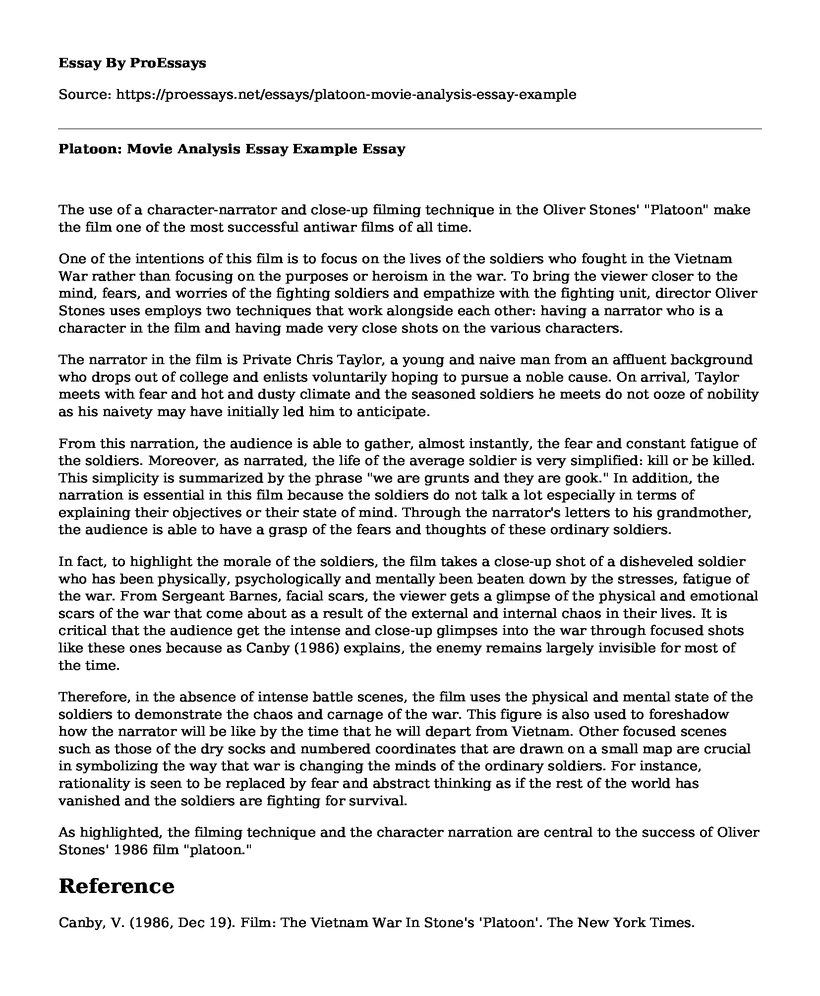The use of a character-narrator and close-up filming technique in the Oliver Stones' "Platoon" make the film one of the most successful antiwar films of all time.
One of the intentions of this film is to focus on the lives of the soldiers who fought in the Vietnam War rather than focusing on the purposes or heroism in the war. To bring the viewer closer to the mind, fears, and worries of the fighting soldiers and empathize with the fighting unit, director Oliver Stones uses employs two techniques that work alongside each other: having a narrator who is a character in the film and having made very close shots on the various characters.
The narrator in the film is Private Chris Taylor, a young and naive man from an affluent background who drops out of college and enlists voluntarily hoping to pursue a noble cause. On arrival, Taylor meets with fear and hot and dusty climate and the seasoned soldiers he meets do not ooze of nobility as his naivety may have initially led him to anticipate.
From this narration, the audience is able to gather, almost instantly, the fear and constant fatigue of the soldiers. Moreover, as narrated, the life of the average soldier is very simplified: kill or be killed. This simplicity is summarized by the phrase "we are grunts and they are gook." In addition, the narration is essential in this film because the soldiers do not talk a lot especially in terms of explaining their objectives or their state of mind. Through the narrator's letters to his grandmother, the audience is able to have a grasp of the fears and thoughts of these ordinary soldiers.
In fact, to highlight the morale of the soldiers, the film takes a close-up shot of a disheveled soldier who has been physically, psychologically and mentally been beaten down by the stresses, fatigue of the war. From Sergeant Barnes, facial scars, the viewer gets a glimpse of the physical and emotional scars of the war that come about as a result of the external and internal chaos in their lives. It is critical that the audience get the intense and close-up glimpses into the war through focused shots like these ones because as Canby (1986) explains, the enemy remains largely invisible for most of the time.
Therefore, in the absence of intense battle scenes, the film uses the physical and mental state of the soldiers to demonstrate the chaos and carnage of the war. This figure is also used to foreshadow how the narrator will be like by the time that he will depart from Vietnam. Other focused scenes such as those of the dry socks and numbered coordinates that are drawn on a small map are crucial in symbolizing the way that war is changing the minds of the ordinary soldiers. For instance, rationality is seen to be replaced by fear and abstract thinking as if the rest of the world has vanished and the soldiers are fighting for survival.
As highlighted, the filming technique and the character narration are central to the success of Oliver Stones' 1986 film "platoon."
Reference
Canby, V. (1986, Dec 19). Film: The Vietnam War In Stone's 'Platoon'. The New York Times.
Cite this page
Platoon: Movie Analysis Essay Example. (2022, Aug 30). Retrieved from https://proessays.net/essays/platoon-movie-analysis-essay-example
If you are the original author of this essay and no longer wish to have it published on the ProEssays website, please click below to request its removal:
- Essay on Impact of Social Media Marketing on Consumer Commodity Purchases
- Town Hall Station Is a Site That Connected to the Tradition Essay
- A Review of the Film Take the Lead Paper Example
- Movie Analysis Essay on "Diehard"
- Movie Analysis Essay on Gattaca
- Essay on Spotify: Global Music Streaming Leader Despite Challenges
- Essay Example on a Tale of Two Photographs: NYC in the 20th Century







